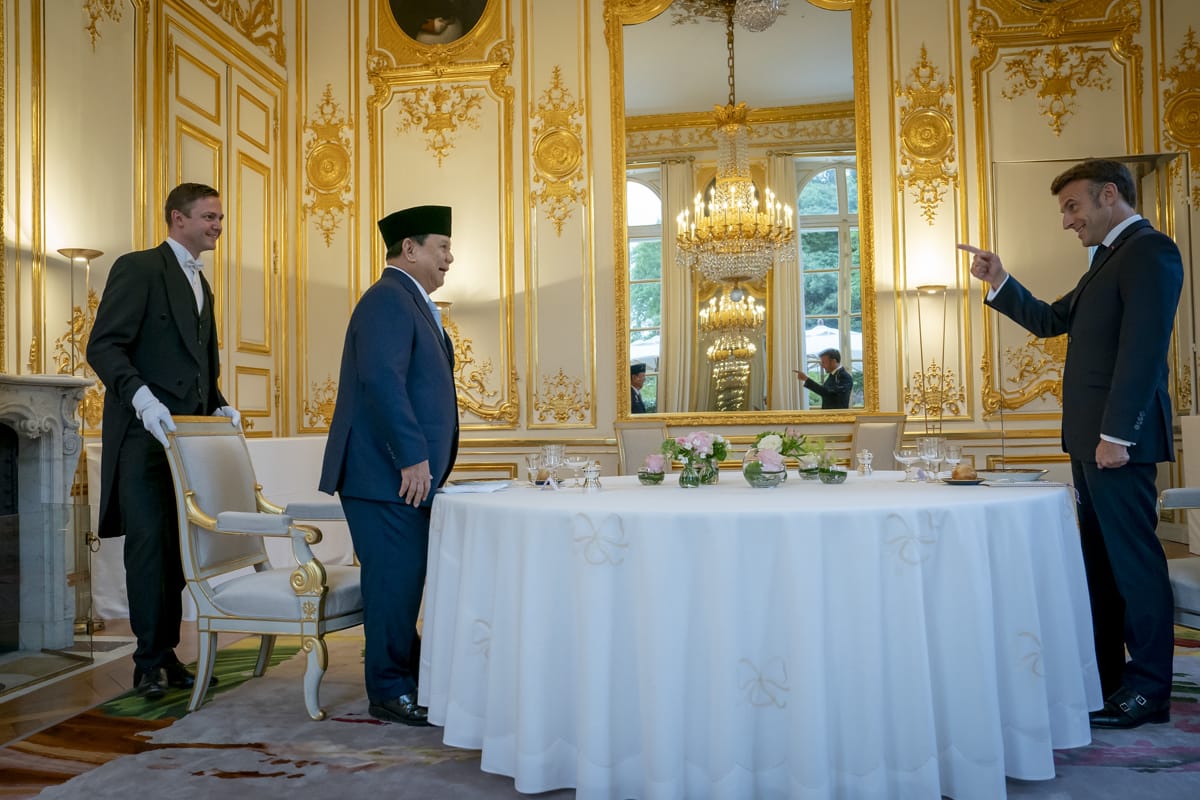With Indonesia on course for political transition ahead of current Defence Minister Prabowo Subianto’s inauguration on 20 October, speculation is rife about what foreign policy themes the new president might bring to office? Will Prabowo continue with the legacy approach of President Joko Widodo? Or will he make a radical departure from his predecessor?
Both are likely at once, in my view.
Prabowo will offer more facetime in world affairs – a “personalistic” approach to foreign policy with active presidential engagement. That will mark a big shift from Jokowi, who with some exceptions was more focused at home.
But in substantive terms, Probowo will maintain a pragmatic position with major and great powers, akin to Jokowi’s approach.
Prabowo began his presidential campaign with a commitment to continue Jokowi’s policies and to build on his legacy. Prabowo appointed Jokowi’s son, Gibran Rakabuming Raka, as his running mate, which won him the backing of the president in the campaign. Prabowo pledged to carry through Jokowi’s signature policies, including industrial downstreaming, infrastructure development, and the relocation of the capital to Borneo.
To complete these programs, however, Prabowo needs to convince major investors – particularly China – to fund the projects. He also wants to continue the modernisation of Indonesia’s defence sector.
But Prabowo brings his own “style” of doing foreign policy. And that’s already on display.
Prabowo seems to be interested in resolving tensions through active engagement at the leadership level, rather than in strengthening regional or international institutions.
After comfortably winning the election in February, Prabowo headed off on a number of overseas trips. For example, in April, he embarked on a series of visits to China, Japan, and Malaysia, in a capacity as both Defence Minister and President-elect. He met President Xi Jinping and Prime Minister Fumio Kishida, among others, and talked about economic and defence cooperation with Indonesia.
He followed up with another tour, in May, to the Middle East, where he met several regional leaders to outline Indonesia’s commitment to resolve the conflict in Gaza through peacekeeping forces. He later spoke at the Shangri-La Dialogue in Singapore and met some world leaders, including Ukraine’s President Volodymyr Zelenskyy.
Most recently, he also toured France, Serbia, Türkiye, and Russia, and met the leaders of these countries to discuss bilateral cooperation, including President Vladimir Putin.
These visits marked Prabowo’s “personalistic” style of doing foreign policy, in which he prefers in-person, bilateral meetings with leaders. This contrasts with Jokowi’s more low-profile approach, in which he employs multilateralism, less engagement at the presidential level, and delegation to Foreign Minister Retno Marsudi.

This personalistic approach is not surprising for Prabowo. In a presidential debate at CSIS Indonesia in November 2023, Prabowo outlined what he called “good-neighbour foreign policy”. He believed that Indonesia should continue its non-alignment policy towards major powers, which has been a consistent theme of Indonesia’s foreign policy tradition.
Nevertheless, Prabowo also set out his belief that Indonesia should pursue good relations with other countries to preserve world peace.
Differing from Jokowi, Prabowo seems to be less enthusiastic about the Association of Southeast Asian Nations, the 11-country grouping covering Southeast Asia, with Indonesia the largest member. While he mentioned the importance of engaging with Southeast Asian neighbours, Prabowo did not explicitly regard ASEAN as a key actor, focusing instead on engagement with the United States and China. ASEAN also did not feature in Prabowo’s campaign manifesto, which was heavily dominated by defence modernisation and national security interests.
For his part, Jokowi had described ASEAN as “the cornerstone of Indonesia’s foreign policy”.
This diminished enthusiasm for ASEAN, along with his vision of “good neighbour” policy and active personal engagement even before being inaugurated as president, provides an early signal of Prabowo’s approach to international affairs. Prabowo seems to be interested in resolving tensions through active engagement at the leadership level, rather than in strengthening regional or international institutions. But he would still maintain his pragmatic approach to deal with great and major powers in his active foreign engagement.
A personalistic approach could also make Prabowo’s foreign policy unpredictable.
This could be good news for Australia. Canberra should not expect Prabowo to radically change the direction that Jokowi has laid down for Indonesia-Australian relations. While ever Australia brings economic and security benefits to Indonesia, Prabowo will be keen to continue constructive engagement.
Indeed, Prabowo is expected to sign a defence pact with Australia at the end of August, with a visit to Australia anticipated this month.
But a personalistic approach could also make Prabowo’s foreign policy unpredictable, at times slow given the scale of issues confronted, and there might be some gaps between his active foreign engagement and the direction at the ministerial level. This could affect the progress in diplomatic relations.
Prabowo’s style will make it difficult to predict how Indonesia might engage with China in particular. It is likely that Prabowo will maintain openness to Chinese investment, particularly if China funds Indonesia’s ambitious development projects. But it will be a relationship determined at the top.
For Australia, it should not expect Indonesia to take a strong position against China, or to abandon its non-alignment policies in the case of US-China tension. Australia can however expect a more “active” Indonesia, keen to engage with many partners, and use this to forge a better relationship, at least at the leadership level.

